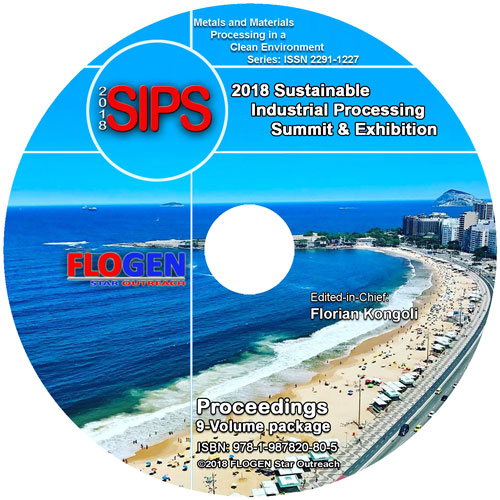2018-Sustainable Industrial Processing Summit
SIPS2018 Volume 4. Mamalis Intl. Symp. / Advanced Manufacturing
| Editors: | F. Kongoli, A. G. Mamalis, K. Hokamoto |
| Publisher: | Flogen Star OUTREACH |
| Publication Year: | 2018 |
| Pages: | 352 pages |
| ISBN: | 978-1-987820-88-1 |
| ISSN: | 2291-1227 (Metals and Materials Processing in a Clean Environment Series) |

CD shopping page
The Ethics of Sustainability
Jeremy Ramsden1; Athanasios G. Mamalis2; Nikolaos T. Athanassoulis3;1UNIVERSITY OF BUCKINGHAM, Buckingham, United Kingdom; 2PC-NAE, DEMOKRITOS NATIONAL CENTER FOR SCIENTIFIC RESEARCH, Athens, Greece; 3LABORATORY OF INDUSTRIAL AND ENERGY ECONOMICS, NTUA, Athens, Greece;
Type of Paper: Keynote
Id Paper: 95
Topic: 48
Abstract:
As crowding on our planet increases, sustainability has become a major preoccupation at many levels: national and supranational (for example, the European Union is strongly promoting the "circular economy", essentially a waste management strategy), but also local and even individual. A considerable body of academic work has arisen around the "circular economy", mostly of recent origin, even though the roots of the concept go back decades and even centuries. On the whole the field seems to suffer from a dearth of analytical thinking, and much of the literature is little more than polemics between supporters and detractors, along with the loose injection of words like "entropy". On the material plane, at the atomic level everything is recycled, except hydrogen and helium; at higher levels involving sophisticated superatomic structures, an illusion of recycling may depend on inadequate definitions of materials that fail to capture all their essential features (for example, paper cannot be endlessly recycled because the cellulose fibres are progressively shortened). This paper seeks to establish what precisely sustainability and the circular economy mean, what the intentions of their protagonists are, and how they fit in with alternative moral schemata, notably the individual versus the social. The goal of our investigation is to establish whether the circular economy can make any claim on our attention as a worthwhile pursuit.
Keywords:
Energy; Nanocomposites; Nanoparticles; Nanostructured materials; Nanotechnology/Nanomaterials manufacturing; Biomedical sustainabilityReferences:
[1] Ramsden, J.J. The impacts of nanotechnology. Nanotechnol. Perceptions 7 (2011) 28-66.[2] Ramsden, J.J. The sustainability of "postmodern" university research. In: Philosophy and Synergy of Information: Sustainability and Security (eds P.J. Kervalishvili & S.A. Michailidis), pp. 74-87. Amsterdam: IOS Press (2012).
[3] Ramsden, J.J. and Kiss-Haypál, G. On a possible limit to economic progress. Nanotechnol. Perceptions 9 (2013) 71-81.
[4] Ramsden, J.J. Applied Nanotechnology (3rd edn). Amsterdam: Elsevier (2018).